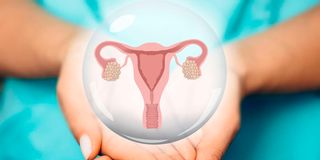New medical procedure that could delay menopause identified

Scientists have identified possibilities of delaying or eliminating menopause altogether via ovarian tissue freezing
What you need to know:
- The model focusing on healthy women undergoing ovarian tissue cryopreservation considers multiple factors, including the age at which a patient gets the procedure, which is significant in determining how long menopause could be potentially be delayed.
- Based on the model, the researchers predict that for most women under 40, ovarian cryopreservation can significantly delay menopause, while for women under 30, the procedure may be able to prevent menopause altogether.
Scientists have identified possibilities of delaying or eliminating menopause altogether via ovarian tissue freezing. A new research published in the American Journal of Obstetrics & Gynaecology indicates the possibility of menopause being delayed in healthy women. This then will allow them to extend their child-bearing years and perhaps even prevent some of the health risks and uncomfortable symptoms linked to plummeting oestrogen levels.
Prof Kutluk Oktay, an ovarian biologist and an adjunct professor of obstetrics, gynaecology and reproductive sciences at Yale School of Medicine, developed and performed the world’s first ovarian transplant procedure with cryopreserved tissue for a patient with a medical indication in 1999. He says he now sees a future in which healthy women could use this process of freezing tens of thousands of eggs within the ovarian tissue to stave off menopause for as long as several decades or even prevent its onset altogether. Using data from hundreds of previous ovarian cryopreservation and transplantation procedures, and molecular studies of how ovarian follicles behave in ovarian tissue, Oktay and his colleagues built the new mathematical model to predict how long the surgery could potentially delay menopause under a range of circumstances in healthy women.
Ovarian tissue cryopreservation has been successfully used in cancer patients to preserve their fertility before their treatments, which can often permanently damage the egg reserve in the ovaries and trigger menopause.
At this point, through laparoscopy (an outpatient operation performed in the abdomen or pelvis using small incisions with the aid of a camera), the surgeon removes the whole ovary or layers of the outer portion, which contains hundreds of thousands of dormant, immature eggs (known as primordial follicles). These tissues are then stored in sealed containers after being frozen with a specialised process and kept as low as minus 160 degrees celcius for later use. In the future, the surgeon reimplants the thawed tissue into the patient. Within three to 10 days after that, this transplanted tissue regains connections with the surrounding blood vessels and restores ovarian function in about three months.
The model focusing on healthy women undergoing ovarian tissue cryopreservation considers multiple factors, including the age at which a patient gets the procedure, which is significant in determining how long menopause could be potentially be delayed.
According to Oktay, the model accounts for women between the ages of 21 and 40. Beyond age 40, data show that the procedure is unlikely to delay menopause for a woman with average egg reserve. But this, he says, can change with the development of more efficient freezing and transplantation methods in the future.
Based on the model, Oktay predicts that for most women under 40, ovarian cryopreservation can significantly delay menopause, while for women under 30, the procedure may be able to prevent menopause altogether.





